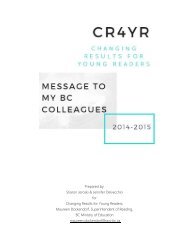Teacher
2015%20Nov-Dec%20Teacher%20low%20res
2015%20Nov-Dec%20Teacher%20low%20res
You also want an ePaper? Increase the reach of your titles
YUMPU automatically turns print PDFs into web optimized ePapers that Google loves.
Composite image from iStock sources<br />
The Gender<br />
Spectrum<br />
Glossary<br />
Queer Terminology<br />
www.qmunity.ca<br />
Gender spectrum The idea that there are many gender identities<br />
(woman, man, cisgender, trans, two-spirit) and a range of gender<br />
expressions (ways people present their gender identity through<br />
hairstyle, clothing, behaviours, etc.).<br />
Gender identity A person’s internal sense of being a man, a<br />
woman, genderqueer, etc. This is not the same thing as a person’s<br />
biological sex.<br />
Gender dysphoria A psychological condition marked by significant<br />
emotional distress and impairment in life functioning caused by<br />
a lack of congruence between gender identity and biological sex<br />
assigned at birth.<br />
Gender expression The ways a person presents her or his sense of<br />
gender to others, e.g., through clothes, hairstyle, mannerisms, etc.<br />
Genderqueer Refers to individuals or groups who identify outside of<br />
the male/female binary. This is a politicized term or identity often<br />
used by people who intentionally challenge dominant gender norms.<br />
Gender non-conforming Refers to people who express gender<br />
in ways that differ from social expectations of the sex and gender<br />
assigned to them at birth.<br />
Gender fluid A fluctuating mix of the gender identities available.<br />
Cisgender A person whose gender identity and gender expression<br />
match the gender typically associated with their biological sex.<br />
For example, a female who identifies as a woman.<br />
Pangender A person who identifies and or expresses the many shades<br />
of gender. Multi-gender and omni-gender are other terms used.<br />
Trans An umbrella term that can be used to describe people whose<br />
gender identity and/or gender expression differ from what they<br />
were assigned at birth. Some trans people may choose to medically<br />
transition by taking hormones or having surgery. Some trans people<br />
may choose to socially transition by changing their name, clothing,<br />
hair, etc.<br />
FTM Generally used to refer to anyone assigned female at birth, but<br />
who identifies or expresses their gender as male all or part of<br />
the time.<br />
MTF Generally used to refer to anyone assigned male at birth, but<br />
who identifies or expresses their gender as female all or part of<br />
the time.<br />
Intersex Refers to people whose reproductive or sexual anatomy is<br />
not easily defined as male or female. There are a variety of ways<br />
someone could fit in this category, ranging from having ambiguous<br />
genitalia to having a mixture of XX and XY chromosomes. The word<br />
hermaphrodite was historically used to describe these individuals,<br />
however, this word is considered highly offensive today.<br />
Two-spirit An Aboriginal term describing the embodiment of<br />
both masculine and feminine spirits. This identity is not limited to<br />
gender expression or sexuality, but encompasses them both while<br />
incorporating a spiritual element.<br />
Social transition The social process that a trans person may go<br />
through when shifting from one gender expression to another. This<br />
may include steps such as changes in style of dress and the selection<br />
of a new name and pronouns.<br />
Medical transition A term most commonly used to refer to the<br />
medical process that a trans person may go through when shifting<br />
from one gender expression to another. This may include steps such<br />
as hormone replacement therapy and/or surgeries.<br />
Pronoun The word one uses to describe themselves, such as he, she,<br />
they, ze, hir, etc.<br />
Transphobia Acts of discrimination directed at trans individuals<br />
and/or those who are perceived as such are based on ignorance,<br />
prejudice, and stereotyping.<br />
November/December 2015 TEACHER 5



